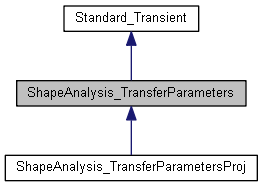This tool is used for transferring parameters from 3d curve of the edge to pcurve and vice versa.
More...
|
| | ShapeAnalysis_TransferParameters () |
| | Creates empty tool with myShift = 0 and myScale = 1. More...
|
| |
| | ShapeAnalysis_TransferParameters (const TopoDS_Edge &E, const TopoDS_Face &F) |
| | Creates a tool and initializes it with edge and face. More...
|
| |
| virtual void | Init (const TopoDS_Edge &E, const TopoDS_Face &F) |
| | Initialize a tool with edge and face. More...
|
| |
| void | SetMaxTolerance (const Standard_Real maxtol) |
| | Sets maximal tolerance to use linear recomputation of parameters. More...
|
| |
| virtual Handle< TColStd_HSequenceOfReal > | Perform (const Handle< TColStd_HSequenceOfReal > &Params, const Standard_Boolean To2d) |
| | Transfers parameters given by sequence Params from 3d curve to pcurve (if To2d is True) or back (if To2d is False) More...
|
| |
| virtual Standard_Real | Perform (const Standard_Real Param, const Standard_Boolean To2d) |
| | Transfers parameter given by sequence Params from 3d curve to pcurve (if To2d is True) or back (if To2d is False) More...
|
| |
| virtual void | TransferRange (TopoDS_Edge &newEdge, const Standard_Real prevPar, const Standard_Real currPar, const Standard_Boolean To2d) |
| | Recomputes range of curves from NewEdge. If Is2d equals True parameters are recomputed by curve2d else by curve3d. More...
|
| |
| virtual Standard_Boolean | IsSameRange () const |
| | Returns True if 3d curve of edge and pcurve are SameRange (in default implementation, if myScale == 1 and myShift == 0) More...
|
| |
 Public Member Functions inherited from Standard_Transient Public Member Functions inherited from Standard_Transient |
| | Standard_Transient () |
| | Empty constructor. More...
|
| |
| | Standard_Transient (const Standard_Transient &) |
| | Copy constructor – does nothing. More...
|
| |
| Standard_Transient & | operator= (const Standard_Transient &) |
| | Assignment operator, needed to avoid copying reference counter. More...
|
| |
| virtual | ~Standard_Transient () |
| | Destructor must be virtual. More...
|
| |
| virtual void | Delete () const |
| | Memory deallocator for transient classes. More...
|
| |
| virtual const opencascade::handle< Standard_Type > & | DynamicType () const |
| | Returns a type descriptor about this object. More...
|
| |
| Standard_Boolean | IsInstance (const opencascade::handle< Standard_Type > &theType) const |
| | Returns a true value if this is an instance of Type. More...
|
| |
| Standard_Boolean | IsInstance (const Standard_CString theTypeName) const |
| | Returns a true value if this is an instance of TypeName. More...
|
| |
| Standard_Boolean | IsKind (const opencascade::handle< Standard_Type > &theType) const |
| | Returns true if this is an instance of Type or an instance of any class that inherits from Type. Note that multiple inheritance is not supported by OCCT RTTI mechanism. More...
|
| |
| Standard_Boolean | IsKind (const Standard_CString theTypeName) const |
| | Returns true if this is an instance of TypeName or an instance of any class that inherits from TypeName. Note that multiple inheritance is not supported by OCCT RTTI mechanism. More...
|
| |
| Standard_Transient * | This () const |
| | Returns non-const pointer to this object (like const_cast). For protection against creating handle to objects allocated in stack or call from constructor, it will raise exception Standard_ProgramError if reference counter is zero. More...
|
| |
| Standard_Integer | GetRefCount () const |
| | Get the reference counter of this object. More...
|
| |
| void | IncrementRefCounter () const |
| | Increments the reference counter of this object. More...
|
| |
| Standard_Integer | DecrementRefCounter () const |
| | Decrements the reference counter of this object; returns the decremented value. More...
|
| |
This tool is used for transferring parameters from 3d curve of the edge to pcurve and vice versa.
Default behaviour is to trsnafer parameters with help of linear transformation:
T2d = myShift + myScale * T3d where myScale = ( Last2d - First2d ) / ( Last3d - First3d ) myShift = First2d - First3d * myScale [First3d, Last3d] and [First2d, Last2d] are ranges of edge on curve and pcurve
This behaviour can be redefined in derived classes, for example, using projection.

 Public Member Functions inherited from Standard_Transient
Public Member Functions inherited from Standard_Transient Public Types inherited from Standard_Transient
Public Types inherited from Standard_Transient Static Public Member Functions inherited from Standard_Transient
Static Public Member Functions inherited from Standard_Transient 1.8.13
1.8.13